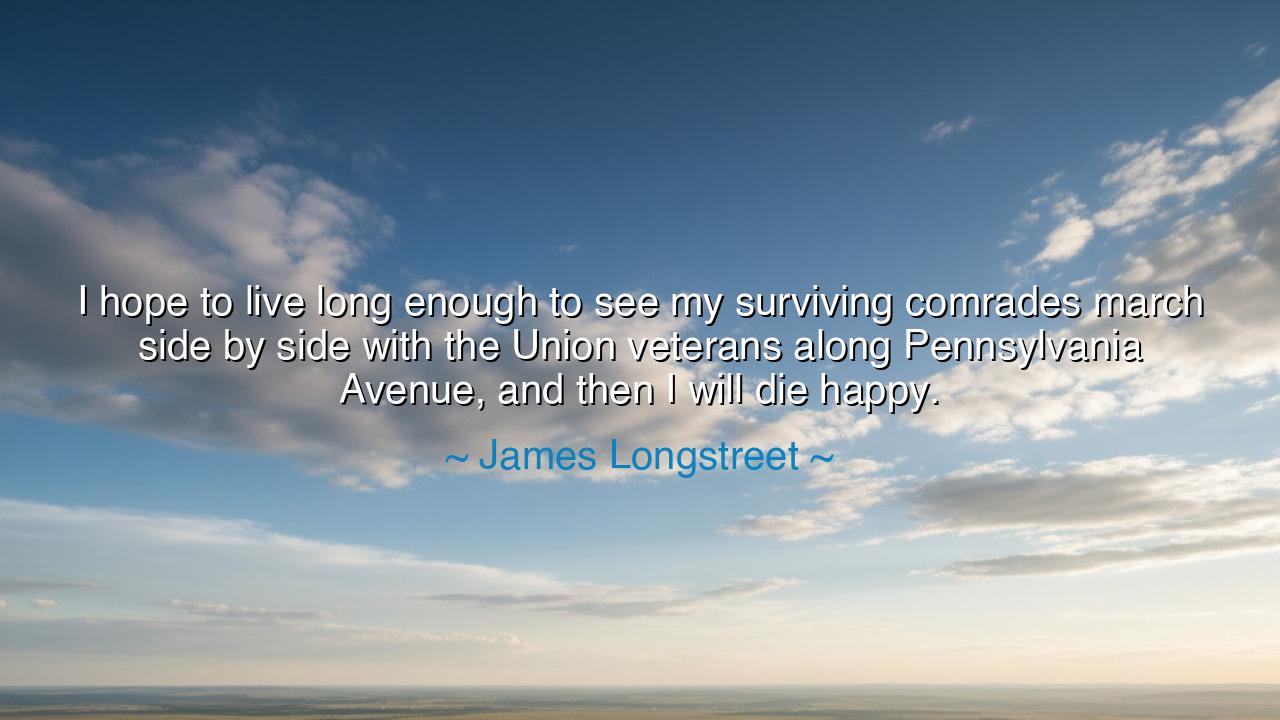
I hope to live long enough to see my surviving comrades march
I hope to live long enough to see my surviving comrades march side by side with the Union veterans along Pennsylvania Avenue, and then I will die happy.






The words of James Longstreet — “I hope to live long enough to see my surviving comrades march side by side with the Union veterans along Pennsylvania Avenue, and then I will die happy.” — carry the weight of a nation’s sorrow and the yearning of a soldier’s soul for reconciliation. They rise not as the cry of triumph, but as the whisper of wisdom born from suffering. In these words, Longstreet, once a Confederate general and a warrior of fierce conviction, speaks not of battle, but of healing — of a dream greater than victory: the unity of hearts once divided by war. His voice becomes that of an elder of the human race, longing to see the sons of one nation stand not as enemies, but as brothers again.
To understand his words, one must first see the man and the age that shaped them. James Longstreet fought under General Robert E. Lee in the American Civil War, leading men into fire and thunder for a cause that would not endure. He watched the fields of Gettysburg and Fredericksburg run red with the lifeblood of a divided people. He saw valor on both sides — men who fought not from hatred, but from duty, loyalty, and belief in their homeland. Yet when the cannons fell silent and the South lay defeated, Longstreet, unlike many of his peers, accepted the verdict of history. He turned his gaze not backward, but forward. He supported reconciliation, even joining the Republican Party — an act that made him a target of scorn among those who could not forgive. Still, his heart sought peace, and his dream, expressed in this quote, was of a future where Union and Confederate veterans could march together in honor, their enmity dissolved by time and brotherhood.
The image of men once divided — now marching side by side along Pennsylvania Avenue, the very heart of the Union — is one of the most poignant symbols in American memory. It evokes the ancient wisdom of nations that have torn themselves apart and long for wholeness again. In this vision, Longstreet is not merely speaking of soldiers, but of the soul of a people. He is saying that the true victory of war is not found in conquest, but in forgiveness. The swords that once clashed must become plowshares, the drums of battle must become the drums of remembrance. His words are a prayer — that before death, he might see his country at peace not in law alone, but in spirit.
History records that Longstreet did indeed live to see the early dawn of such reconciliation. In the decades after the war, veterans’ reunions became a sacred ritual. Old men in gray and blue shook hands across the stone walls of Gettysburg, tears falling where bullets once flew. Flags that had once opposed each other were lowered together in reverence for the fallen. In those quiet, trembling gestures, the hope of Longstreet was fulfilled — not in grand speeches, but in the silent understanding that brotherhood outlives bitterness. The wounds of war, though deep, were not eternal.
In the ancient world, the same longing for reconciliation has echoed through the centuries. After the Peloponnesian War, when Athens and Sparta lay exhausted, philosophers like Plato and Xenophon wrote of unity and shared destiny — that a people divided against itself could never prosper. The Romans, too, after civil strife, sought to bind their fractured hearts beneath the ideal of pax Romana, the peace of Rome. So it has always been: the wisest warriors are not those who glory in victory, but those who, having seen the abyss of conflict, dedicate their remaining days to peace.
Longstreet’s quote teaches that true heroism lies not in the fury of battle, but in the humility that follows it. To wish to see one’s enemies become comrades is to transcend the narrow pride of sides and banners. It is to understand that the blood shed in war is the same color on both fields, that the mothers who mourn in the North and the South weep the same tears. His dream of reconciliation is not bound to his century alone — it is a message to every age that divides itself by creed, color, or cause. The wars of men may change, but the cure for division remains the same: forgiveness and shared remembrance.
Let this wisdom be carried forward: Seek peace beyond pride. Do not let hatred outlive the reasons that birthed it. Stand beside those who once opposed you, and see not the rival, but the reflection of your own humanity. For as Longstreet reminds us, only when enemies walk together can a nation — or a soul — find rest. To live long enough to see former foes march side by side is to witness the resurrection of the human spirit. And when that day comes — when reconciliation triumphs over resentment — then, and only then, may we say, as Longstreet dreamed: “Now, I can die happy.”






AAdministratorAdministrator
Welcome, honored guests. Please leave a comment, we will respond soon